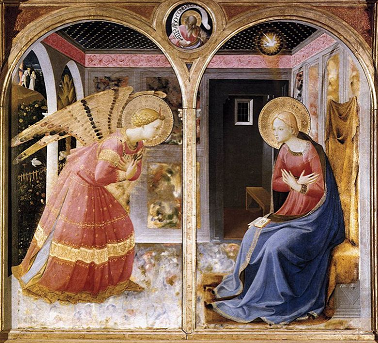Reception and Pondering – The Annunciation of Our Lord
This is part one of a short series on the Joyful Mysteries of the Rosary as a guide for discernment. The introduction and “index” are here. The next mystery, The Visitation, is here.
The Annunciation of Our Lord

This first stage of discernment, corresponding to The Annunciation, we might refer to as reception and pondering. We receive a message that we’re “pretty sure” is from the Lord, give our assent to God’s intervention, then are left to ponder what just happened.
- Gabriel appears to Mary at an unexpected time and place. This is Nazareth, after all, in Galilee. A place of which Nathaniel asks “Can anything good come out of Nazareth?” As far as we know, Mary wasn’t banging on God’s door looking for answers. There’s ancient tradition that hold Mary was devoted to service in the Temple, but for now, at least, the angel Gabriel “was sent from God to a town of Galilee called Nazareth.”
- When the Angel arrives, he finds Mary’s heart well prepared to receive the message he bears. He is able to greet her as “favored one,” and to repeat, in case she wasn’t sure, or was afraid, “you have found favor with God.”
- The message of the Lord is specific, but it is not exactly laid out step by step. It is a bit unsettling. It requires faith to receive. Parts of it need to be pondered.
The messenger (that’s what angel means) of the Lord appears to us, wherever we are. Occasionally, the messenger is obviously miraculous or supernatural, perhaps an angel visibly present, or a locution. Many times the message comes to us through a “regular ‘ole person,” but there’s something within our spirit that recognizes “this is a message from the Lord.”
There’s something about Gabriel, too. He doesn’t explain himself at all. There’s no “hey Mary, don’t worry, I’m one of the good Angels, you can trust me. See, look, I have a halo, not horns.” It’s simply “Hail, favored one, the Lord is with you.”
Sometimes, we are called to be a messenger, an angel of the lord (but not “The Angel Clarine”, just “a messenger”). When we’re so called, our response should be the same as Gabriel. Go to the person where they are (don’t wait for a convenient time or place), greet them in the name of the Lord, deliver the message, and skedaddle. Don’t stick around to see what they do next, don’t try to explain what you think is going on, and don’t try to add anything to what you’ve received to pass on.
Usually, this message of the Lord, unless it is a call to repentance, comes to a heart that is prepared. Did this great idea come at 2AM after killing off three 30-packs and a bottle of fireball? Good chance it’s my great idea. Am I in a state of grace? Have I been to confession recently? Did it come during adoration? Odds are higher it might be God’s great idea. On the other hand, God speaks of God’s own free will, and comes to us where we are, so hold this idea gently.
What about the message itself? Is the message one of joy and hope, or one of fear? Consistently, even when the message is dire, the first words out of an Angel’s mouth are “fear not.” Our enemy condescends to whisper sour nothings of fear and doubt in our ears, but our God consistently speaks of faith, hope, and charity. Gabriel’s message was super clear; “you will conceive… bear a son.. name him Jesus… he will be Son of the Most High… called holy – the Son of God” Where Mary had innocent questions “um… but I’m a virgin…” the angel pointed to the power of God, and offered the example of God’s faithfulness and power (Elizabeth’s conception at an advanced age).
There’s plenty left unsaid, lots of unanswered questions we might wonder why she didn’t ask (e.g. what should I tell Joseph?). Ultimately, however, the first stage, this stage of reception and pondering, is about trust. The word of the Lord comes to us. We believe it’s the word of the Lord. Are we willing to submit our will? Will we trust God, knowing that we don’t understand everything, and we have plenty to ponder, but without using that pondering as an excuse to delay giving our trust and assent?
